Legal highs: Police handle surge in incidents ahead of ban
- Published
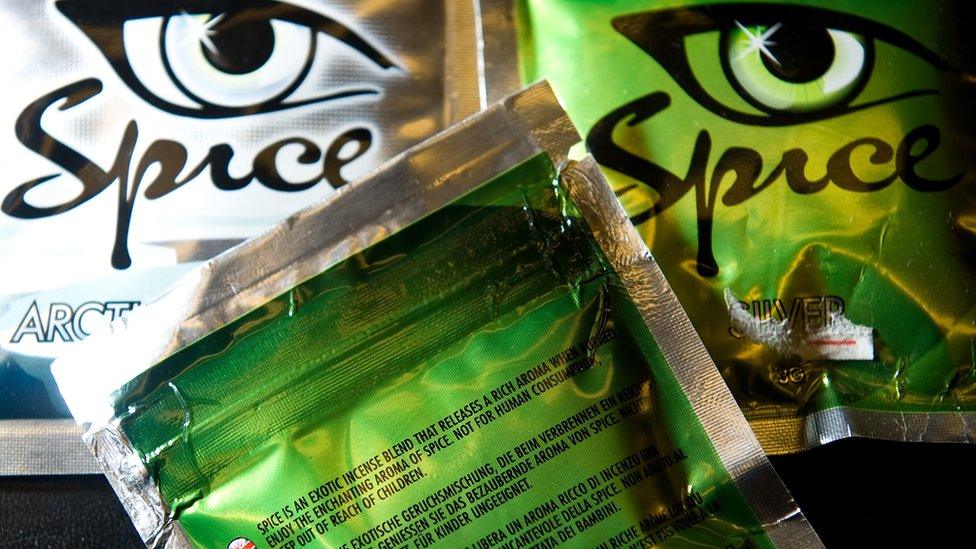
Legal highs will be criminalised from 26 May 2016
The impact of legal highs on police forces across England can be revealed ahead of a blanket ban on the products, which will come into effect in weeks.
Freedom of Information responses show the range of anti-social behaviour and crime associated with the drugs.
Figures show an upsurge in incidents since 2011 with thousands of mentions in police logs.
The government said it would abolish the "abhorrent trade".
So-called "legal highs" are psychoactive drugs that contain various chemical ingredients, some of which have already been made illegal while others have not. They produce similar effects to illegal drugs like cocaine, cannabis and ecstasy.
The data has been gathered by the BBC English Regions data unit and BBC Look North.
A blanket ban on legal highs will come into force on 26 May 2016 through The Psychoactive Substances Act
The BBC asked police forces for a breakdown of incidents in which different types of legal high were mentioned, such as Spice, Clockwork Orange and Nitrous Oxide.
Out of the 39 police forces in England, 23 were able to provide at least part of the information. However, many of those who refused said it would cost too much to conduct a "free text" search on their logs.
Police logs more than doubled in Cheshire, Merseyside, Lancashire and Leicestershire between 2013 and 2016.
Separate figures from the Prisons and Probation Ombudsman Nigel Newcomen also reveal there were 39 fatalities behind bars linked to legal highs between June 2013 and June 2015, compared with 19 recorded between April 2012 and September 2014.

One tablet cost son his life
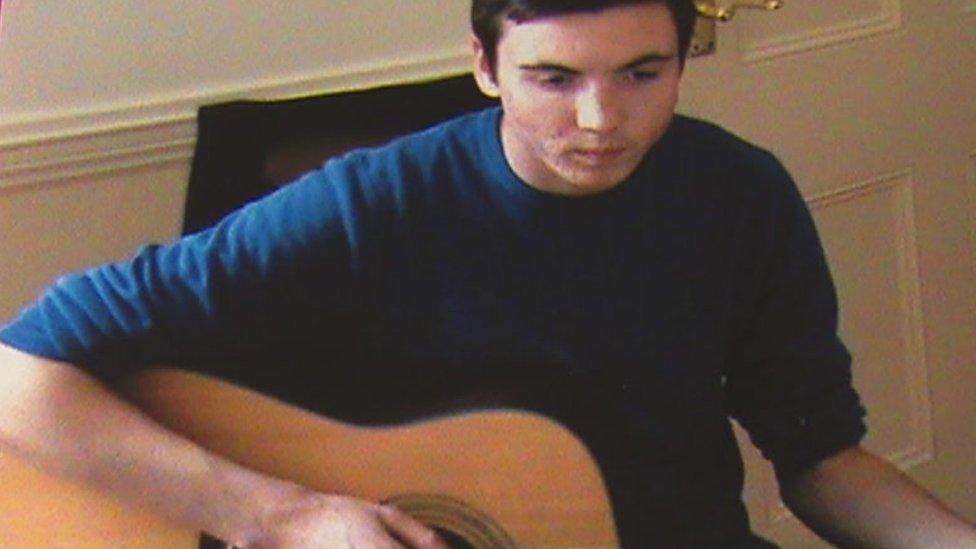
Aidan Karpenko died after taking a legal high
Aidan Karpenko was 19 when he died in June 2014 after taking one tablet of etizolam, which had been bought legally over the internet.
Etizolam was classed as a legal high in 2011 but is also sold in chemists in many countries as a treatment for insomnia and anxiety.
Songwriter Mr Karpenko's mother Louise Tasker-Lynch, from Chesterfield, has co-founded Keep our Young Safe and believes the change in the law relating to legal highs cannot come soon enough.
"There was no history of drugs whatsoever (with Aidan)," she said.
"I can't understand why people would want to put other people at risk when they don't know anything about their situation or how it would affect their bodies.
"I want to see a change in legislation where they do ban these drugs and should anybody sell them I want them to be made accountable.
"I don't want anybody to go through what we went through. We're still going through it now and we probably will for the rest of our lives."

Get the data and read released police logs here, external
Incidents range from low level anti-social behaviour to making threats to kill. Our investigation found:
Thousands of incidents police were called to involved people who had taken legal highs
There has been a huge surge in their popularity over the past five years
Cheshire Police recorded the biggest percentage rise since 2013. However, it limited its search to the terms "legal highs" and "Spice".
Spice, a synthetic cannabinoid used as an alternative to cannabis, appeared the most in police logs in 2015-16. There were 384 mentions of it between the forces that broke down their figures, with 267 of those in Merseyside, 61 in Lancashire and 34 in Suffolk.
Black Mamba was also referred to in 20 logs disclosed for 2015-16. The synthetic cannabis was made an illegal Class B drug in 2013.
Police were able to identify 139 records of "laughing gas" and a further 124 by its formal name, nitrous oxide. There were another nine instances of it recorded as "hippie crack" and two as "chargers".
Parts of England have seen large increases in the number of police incidents involving legal highs. South Yorkshire has seen a 300 fold increase and West Yorkshire a 200 fold increase from 2011-12 to 2015-16. The data was supplied in a separate FOI request sent by BBC's Look North.
The most detailed police logs revealed came from Hertfordshire Constabulary.
The force revealed the details of 97 calls to incidents involving legal highs since 2011. They included one in 2015-16 in Rickmansworth where the log said: "Boyfriends smashing place up after taking legal highs."
Another from Hertford in 2013-14 said: "Male is constantly smoking something, think it may be legal highs. He screams at night time saying 'get out of my head and running about in and out of block and screaming 'I am going to kill you'. He says it to himself."
A blanket ban on legal highs will come into force on 26 May 2016 through The Psychoactive Substances Act.
Home Office Minister Karen Bradley said: "Psychoactive substances shatter lives and we owe it to all those who have lost loved ones to do everything we can to eradicate this abhorrent trade.
"This Act will bring to an end the open sale on our high streets of these potentially harmful drugs and deliver new powers for law enforcement to tackle this issue at every level in communities, at our borders, on UK websites and in our prisons.
MPs have raised concerns that the new law was being rushed amid a lack of clarity over whether it would work. And the homeless charity Centrepoint has warned that the blanket ban may not be enough, calling for better treatment and education on substance use.
Mike Pattinson, executive director of the charity Change, Grow, Live (CGL), said: "The stories today indicating that the police have seen a rise in public incidents and deaths in custody due to the use of legal highs highlights the severe lack of knowledge of how dangerous these substances are and that they are a national problem which is not going to go away any time soon.
"There are significant potential health risks and serious consequences caused to the people that use them and their families. 'Legal highs' often contain illegal substances and can be just as harmful and addictive as illegal drugs such as cocaine, ecstasy or heroin. As their chemical makeup is unknown, their effects are unpredictable and the health risks are unpredictable."
- Published10 May 2016
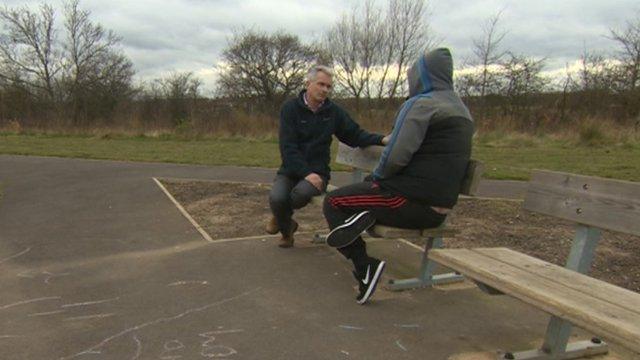
- Published26 May 2016
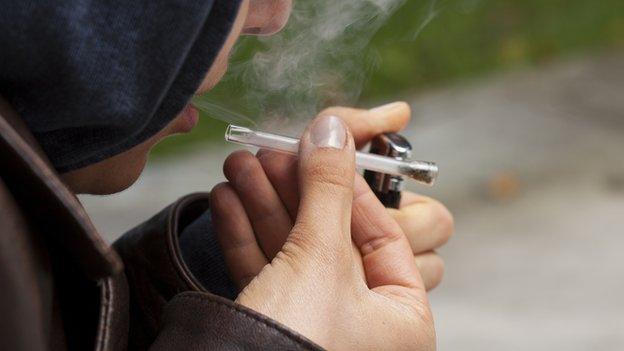
- Published16 March 2016
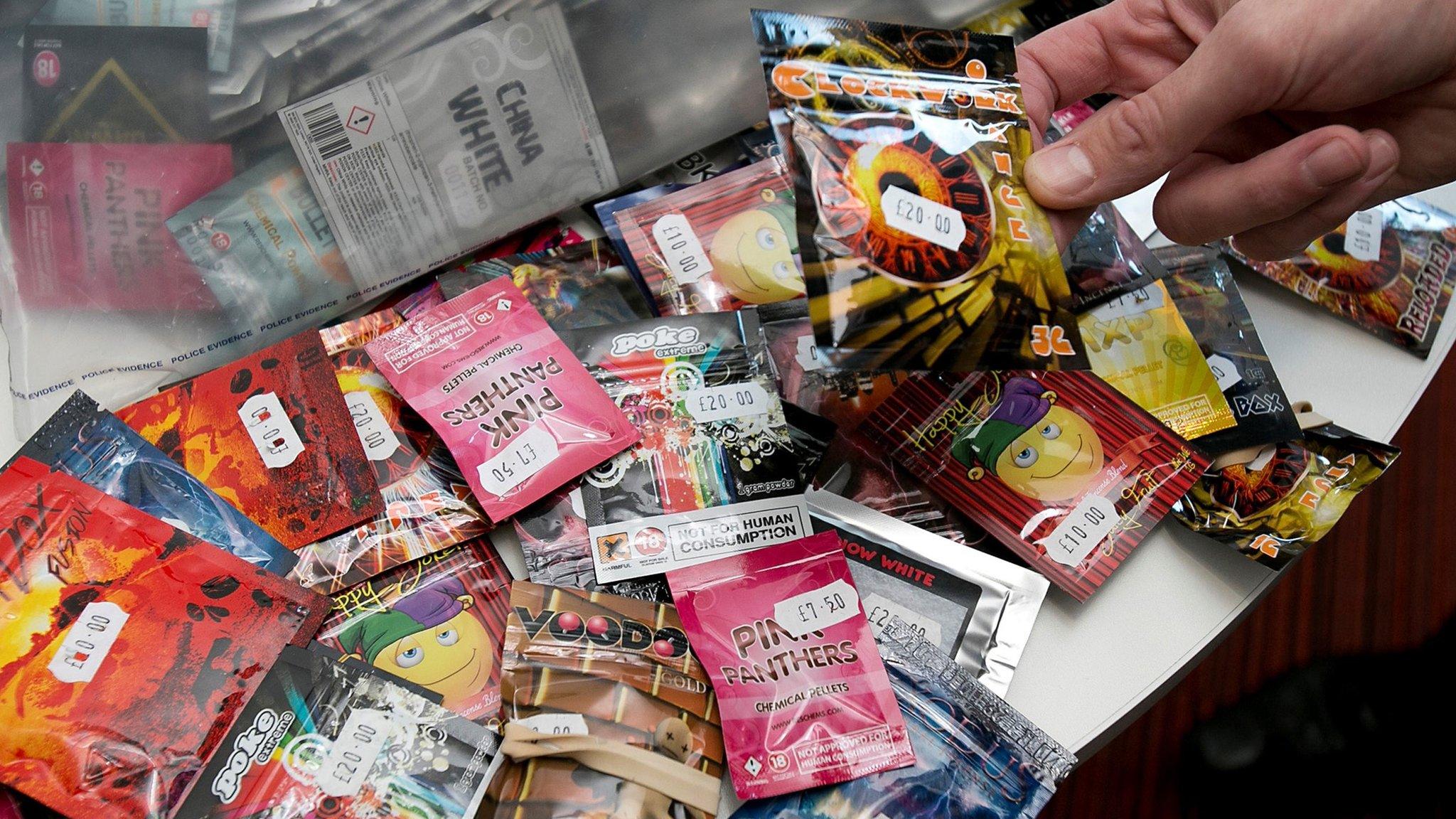
- Published8 March 2016